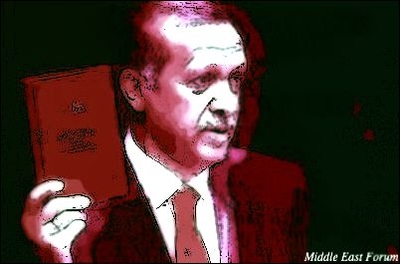Erdoğan’s Rediscovery of America
Ali Ibrahim/Asharq Al Awsat
Wednesday, 19 Nov, 2014
We do not know what prompted Turkish President Recep Tayyip Erdoğan to say, during his reception of a Latin American delegation, that he was certain that Muslims discovered North America 500 years before Christopher Columbus did. The Genoese explorer accidentally discovered the New World, thinking at the time that he had found a new route to Asia. He also mistakenly referred to its aboriginal inhabitants as Indians.
Erdoğan has a fiery temperament, which always puts him under the spotlight and is often visible in the way he reacts to events. But he is also skillful at making controversial statements that make headlines, something the media loves. Therefore, his comments about Muslims discovering America have spread rapidly across the global media, regardless of whether they truly reflect what he believes or were only meant to attract attention.
There aren’t many credible accounts of the Americas being discovered by Europeans or Middle Easterners before Columbus, or any reliable accounts of anyone crossing the vast Atlantic Ocean, previously known as the “Sea of Darkness” due to the common medieval belief that beyond it lay the edge of the world. But nothing can be ruled out, either. Perhaps others, including Muslims, reached the Americas one way or another before Columbus. Some narratives and evidence suggests the arrival of Scandinavian explorers hundreds of years before Columbus. But other than this, other stories remain mere tales which may or may not be based in fact. There is no point in saying that Muslims discovered America before Columbus, other than to express one’s wishful thinking.
Columbus worked for the Spanish Crown, which at the time was preoccupied with proselytization and religious warfare with the aim of promoting Catholicism. Spain made a huge fortune from the New World, whose aboriginal inhabitants were harmed (to say the least) by arrivals from the Old World. Their long isolation and lack of immunity to European viruses made them vulnerable to fatal diseases borne by passengers on ships from that part of the world.
Spain was obsessed with gold of which it amassed great quantities, making it the world’s richest empire for some time. It paid off its debts, but also squandered much of the newly acquired fortunes in waging religious war. While other rival colonial powers in Europe invested what they got from the New World into industry and trade, accumulating fortunes and becoming richer and more powerful, the country that funded the expedition did not benefit as much.
A lot of gold and silver came from the New World after Columbus’ discovery. But it is said that those food crops of the Americas that were previously unknown to Europeans were more valuable than gold. One such crop was the potato, cultivated on an extensive scale beginning in the 16th century. It is considered today the world’s fifth most important crop after wheat, rice, corn, and sugar cane. At one time this crop saved some European countries from famine. Tomatoes also came from the New World, among others.
The trade, cultivation and renewed production of such new crops must have made fortunes ten times as much as that of gold over the centuries. Given its ease of cultivation and long shelf-life, the potato crop played an important role in the Industrial Revolution as a staple food of new urban workers.
All of this has now passed into history, but we can draw valuable lessons by looking at who invested or squandered wealth, and which nations rose and fell. There is no point in attempting to rewrite history. History should be read as history, while what is important is to have a vision for the future, rather than indulging in retrospective searches for what has been lost. Civilizations are built by looking towards the future. And as the common proverb goes: what is past is dead and gone.
How to read history is among the problems of the Middle East, whose inhabitants are by nature fond of looking back to the past. The region is home to some of the most ancient civilizations in recorded history, the alphabet, and many branches of science. It is also the cradle of the three heavenly religions. Like all world civilizations, the region went through periods of ups and downs. But right now it has a problem as far as reading history is concerned. When they have confidence in themselves and their ability to build a better future, people read history to learn and benefit from the lessons of past nations, not to fight or obsess over chances missed centuries ago. America was discovered a long time ago, and an eventful history has passed in the interval during which maps have been redrawn and politics altered. History does not need to be rediscovered.




















